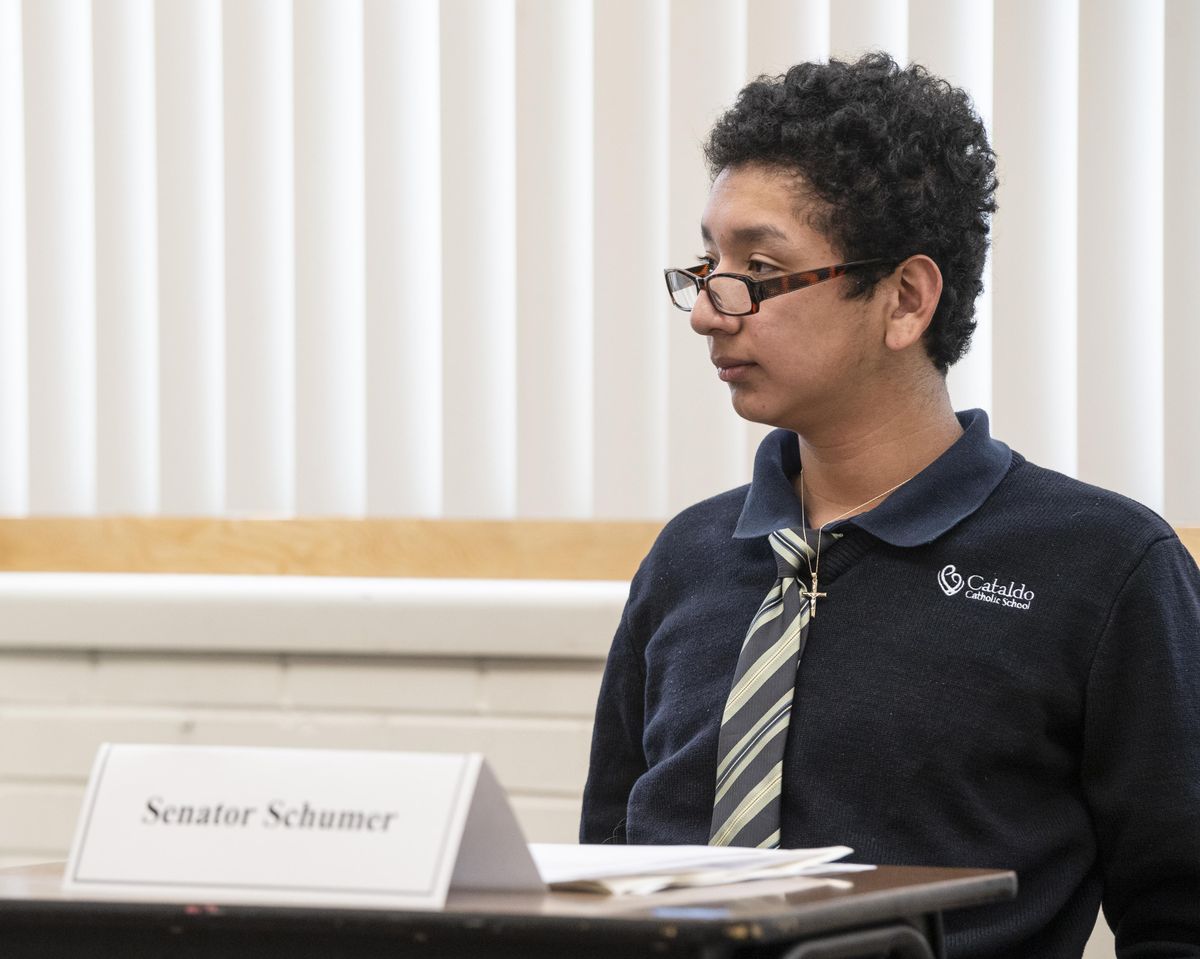This column reflects the opinion of the writer. Learn about the differences between a news story and an opinion column.
Shawn Vestal: Cataldo Catholic School’s 8th graders turn impeachment into a civics lesson

Cataldo Catholic School eighth-grader Sara Robideaux – channeling Sen. Bob Casey – called the articles of impeachment a “textbook case of abuse of power that demands action,” and voted to convict the president.
Fellow student Emma Dwonch – as Sen. Susan Collins – argued, “The House did not fulfill its job to prove the president should be removed,” and voted to acquit.
Ryan Jackson – aka Sen. Bernie Sanders – said “Republicans have been nothing but shady” in denying witnesses, and voted to convict.
Jett Elliott – as Sen. Joni Ernst – asserted, “It is more than evident the House did not provide due process,” and voted to acquit.
Back and forth it went Wednesday morning in the impeachment trial of President Donald Trump, held in the eighth-grade history class at Cataldo Catholic School. As in the actual Senate, 2,500 miles away and later in the day, Cataldo “senators” acquitted Trump on two articles of impeachment, with votes breaking down 12-10 along party lines.

There were a few surprises. Cataldo’s version of Joe Manchin came off the fence to mount a persuasive case to convict – whereas the real Sen. Joe Manchin was a fence-sitter until the final vote. And Cataldo’s Mitt Romney fell in line and voted to acquit the president – while D.C. Mitt crossed the partisan Rubicon and voted to convict, on one count at least.
Overall, in Cataldo and in D.C., the votes reflected a majority view that the facts didn’t rise to the uniquely high bar the founders established to remove a president from office.
As Cataldo Mitch McConnell – aka Peter Ellison – put it, “It’s important for us to have impeachment” as a constitutional remedy for a lawless president. “But you should only use it in extreme cases.”
Teacher Paul Dodroe wanted to focus his students’ attention on the historic moment, while using it as a tool for learning about the Constitution, government and politics. Students were each assigned a senator to represent and tasked with forming an argument on that senator’s behalf, while considering the competing elements of the vote: moral, ethical, legal, practical and political.
Dodroe tried to give each of the 22 students a senator with a complicated political calculation – a red senator in a blue state, such as Collins of Maine, or someone in the opposite position, such as Arizona Sen. Kyrstin Sinema, for example.
For Dodroe, who has taught eighth-grade history at Cataldo for a decade, the recent impeachment was too big an educational opportunity to miss. He wanted his students to understand the historical nature of the moment, as well as the fundamentals of American government upon which the process proceeded.
“There’s a good chance that your kids will read about this in their eighth-grade history textbooks,” he told the students before they voted.
In the days before the vote, Dodroe’s students studied the Constitution and the process of impeachment. The students researched their assigned senator’s political background and public arguments on the matter, and the parties caucused Tuesday and Wednesday before voting.
There were initially fence-sitters on both sides. Heading into the final caucus Wednesday, party leaders were trying to whip their teams into shape.
“If any of them still want to vote ‘Yea,’ I’m going to strong-arm them,” said Ellison, the Cataldo Mitch McConnell.
Turned out he didn’t need to. The Republican team was unanimously on board. Phoenix Sandbo – as Sen. Ben Sasse – said the House impeachment case was built on politically motivated lies, noting that Democratic Rep. Al Green had begun arguing for Trump’s impeachment immediately upon his election.
The Democrats, meanwhile, were caucusing as well, with the last couple of undecided senators hopping off the fence on the side of conviction. Wyatt Lee, as Sinema, cited the number of lies the president has told over his time in office, and warned of a dangerous precedent. Colm McFetridge, as Manchin, had also decided to vote to convict the president.
“If he gets away with this, that means he can get away with this in the future, and other presidents can as well,” McFetridge argued.
After the caucuses, each student gave a brief presentation, and cast their vote.
Blaze Gapen – as Sen. Cory Gardner – argued that the evidence was not conclusive and that voters would soon have a chance to weigh in themselves, and voted to acquit.
McFetridge – as Manchin – urged his colleagues to “put your country over your party and your loyalty to office over your loyalty to a man,” and voted to convict.
Maddie Owen – as Sen. Martha McSalley – pointed to the fact that the Senate has never removed a president from office, and voted to acquit.
Tess Keyes – as Sen. Tina Smith – said the president’s obstruction of Congress “fractures the balance of power between the legislative and executive branches,” and voted to convict.
In the end, it was Dodroe – channeling Supreme Court Chief Justice John Roberts – announcing the result: “The president stands acquitted of the articles of impeachment.”
And then it was time for lunch.